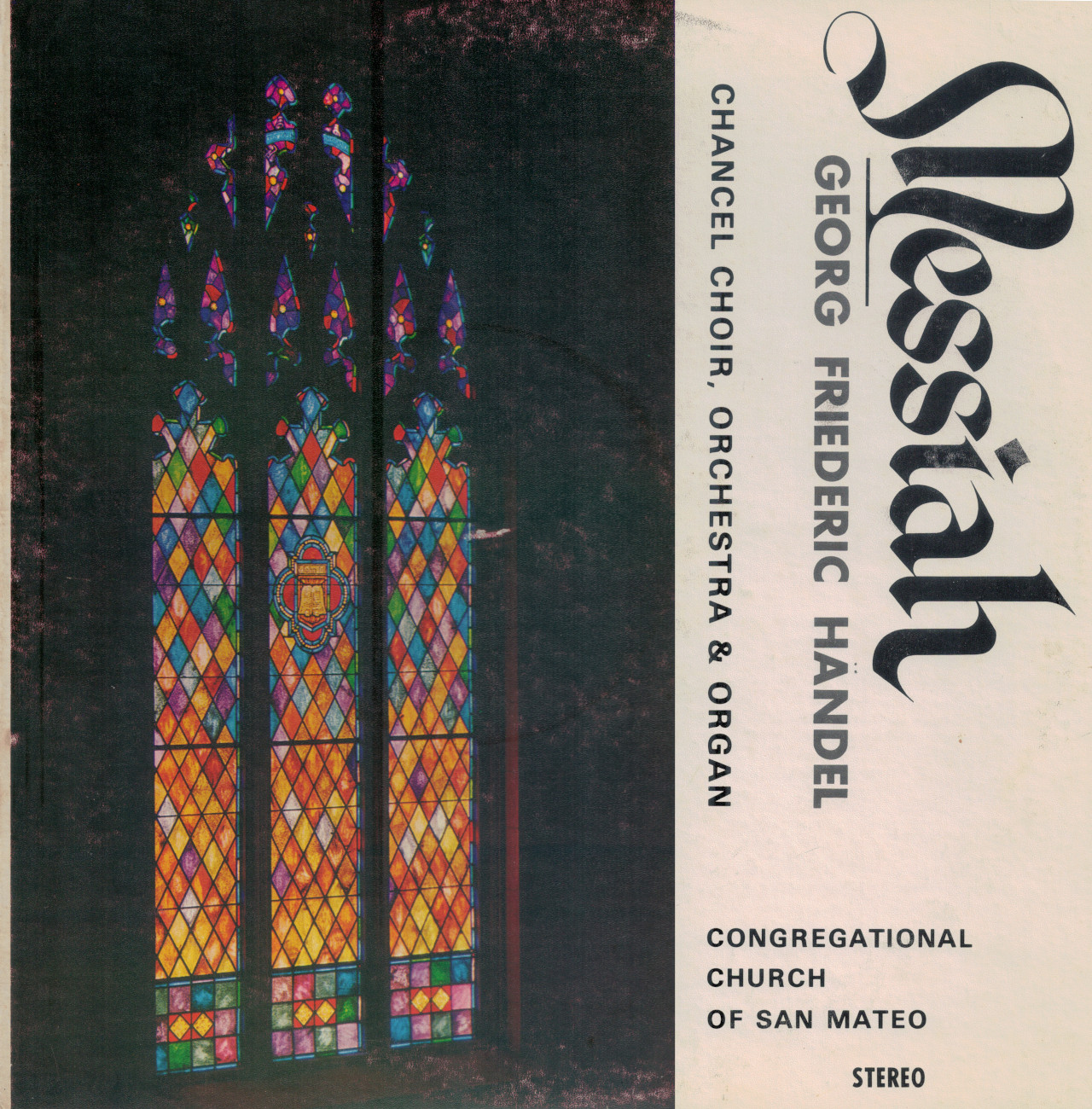|
• Lewis Perry: On Living Alone
Lewis spoke at the Resident Lecture Series on 18 March 2019.
The Series occurs once a month at Piedmont Gardens and is
organized by Flossie Lewis, supremely gifted teacher who
also makes her nest at PG.
Audio only recording The text Lewis read from is here. He begins reading his “Never Too Late” poem at 35:34. |
|
• Elizabeth Robinson Ratcliffe - Reflections on Life
(00:00-58:11)
From growing up in China in the 1920s and ’30s, to getting a Byzantine
Medieval Art History MA degree (1973), to working as a psychotherapist for
more than 30 years in Oakland and Berkeley, CA.
Audio only recording
• Lewis Perry - The High Point of My Career
beginning at 58:12 (to 01:16:02)
|
Recorded in 1976 by Elizabeth with her father, Harold Wesley Robinson, when he was 90 years of age. As she recounts at the tape’s conclusion:
recorded by her daughter Patty, 12 December 2012

-
Part I, March 1999 (46:35)
- Harold Wesley Robinson’s photographic memory - starts at 13:54
- How HWR was drawn to China - starts at 20:22
- the American Board Mission (ABCFM) sent HWR to China - starts at 23:08
- Mary Robinson’s calling card - starts at 32:42
- Harold and Mary taught H.S. wherever they lived in China - starts at 34:15
- “We always kept goats...” - starts at 44:29
- “And here’s the birthday party...” - starts at 44:56
-
Part II, March 1999 (46:50)
- Robinsons and other American Board members in Paotingfu, circa 1922 - starts at 00:50
- “Hal’s & Jim’s amahs and bound feet - starts at 05:35
- “The old home” South Hollow, Warren, Vermont - starts at 12:24
- “This is my grandmother Robinson...” - starts at 14:08
- Harold Wesley Robinson when he would return to Vermont - starts at 15:33
-
Uncle Guy and
Aunt Bess visit Long Beach - starts at 16:04
George Garrison and Adda Wooley Stambaugh - Sidney and Betty Jeanne Stambaugh - starts at 17:07
-
1925 Passport
Photograph in Long Beach, California - starts at 23:04
Mary and Harold take stock of their lives -
Robinson house
in Paotingfu - starts at 25:12
very important Chinese people in Elizabeth’s life
including her amah, Tien Da Tsao and the cook, "Zang Sha Fu" -
how the
little ones went up the mountain to Gwantzeling - starts at 32:02
Jim, Emma Rose, Elizabeth, and Faith Galt in winter
at Peitaiho on the Pacific ocean in the summertime
- Part III, March 1999 (42:05)
- Part IV, June 1999 (47:30)
| SIDE 1 – 24:22 | ||
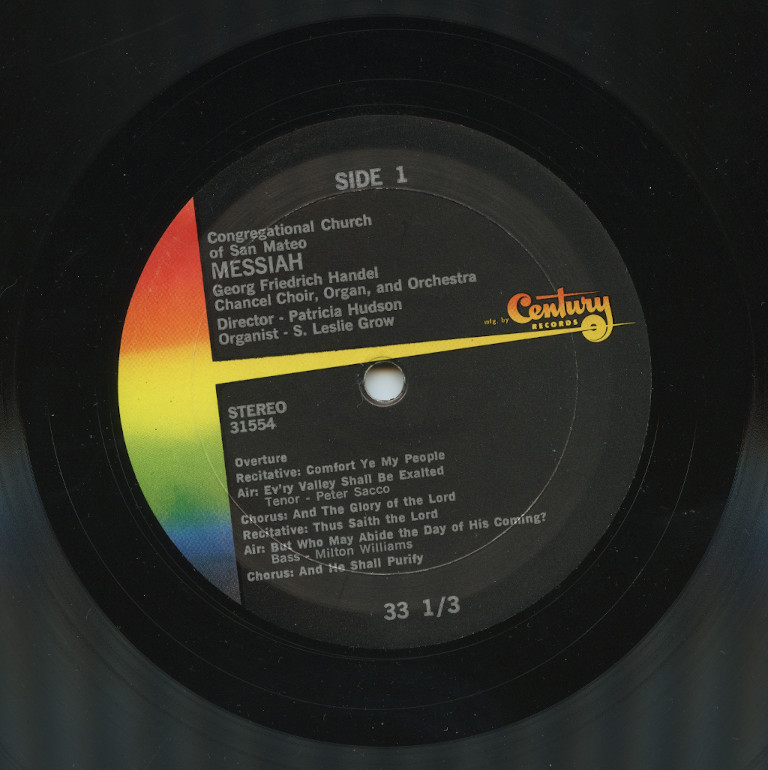
|
Overture
Recitative: Comfort Ye My people Air: Ev’ry Valley Shall Be Exalted Tenor - Peter Sacco Chorus: And The Glory of the Lord Shall Be Revealed Recitative: Thus Saith the Lord Air: But Who May Abide the Day of His Coming? Bass - Milton Williams Chorus: And He Shall Purify |
|
| SIDE 2 – 17:58 | ||
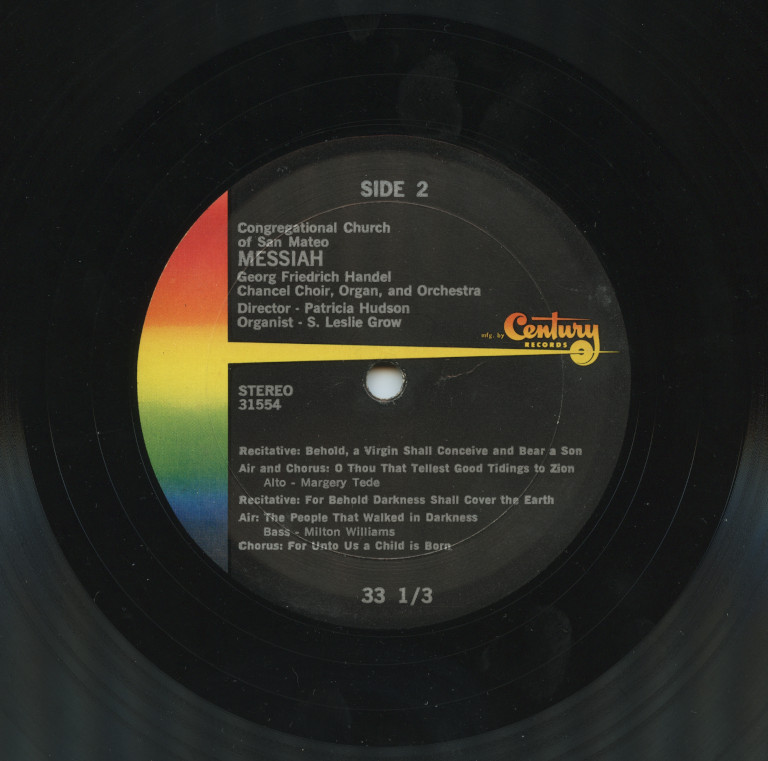
|
Recitative: Behold, a Virgin Shall Conceive and Bear a Son
Air and Chorus: O Thou That Tellest Good Tidings to Zion Alto - Margery Tede Recitative: For Behold Darkness Shall Cover the Earth Air: The People That Walked in Darkness Bass - Milton Williams Chorus: For Unto Us a Child is Born |
|
| SIDE 3 – 24:04 | ||
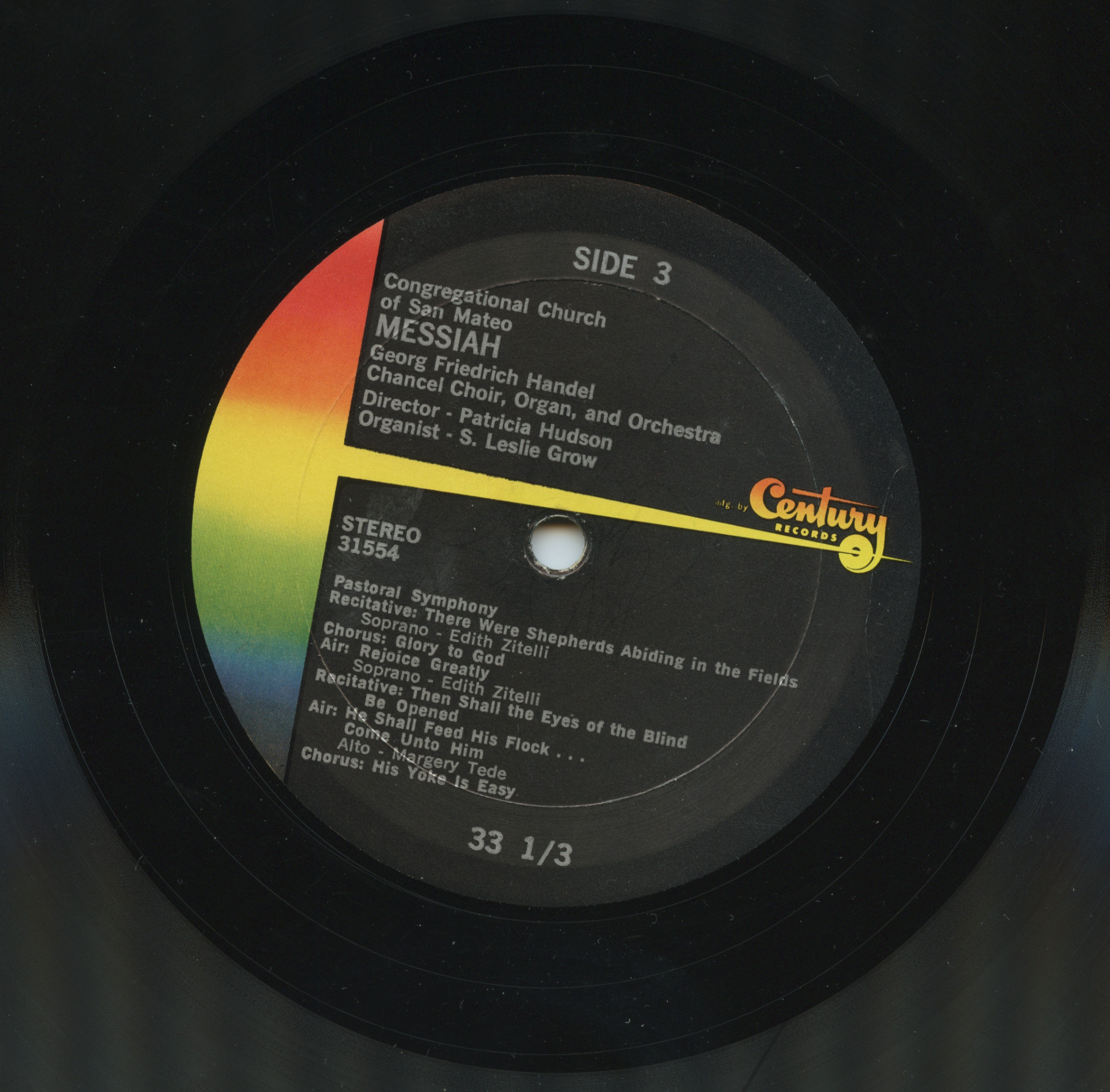
|
Pastoral Symphony
Recitative: There Were Shepherds Abiding in the Fields
And Lo! the angel of the Lord came upon them
Soprano - Edith Zitelli
And the angel said unto them And suddenly there was with the angel Chorus: Glory to God Air: Rejoice Greatly Recitative: Then Shall the Eyes of the Blind Be Opened Air: He Shall Feed His Flock . . . Come Unto Him Alto - Margery Tede Chorus: His Yolk Is Easy |
|
| SIDE 4 – 23:54 | ||
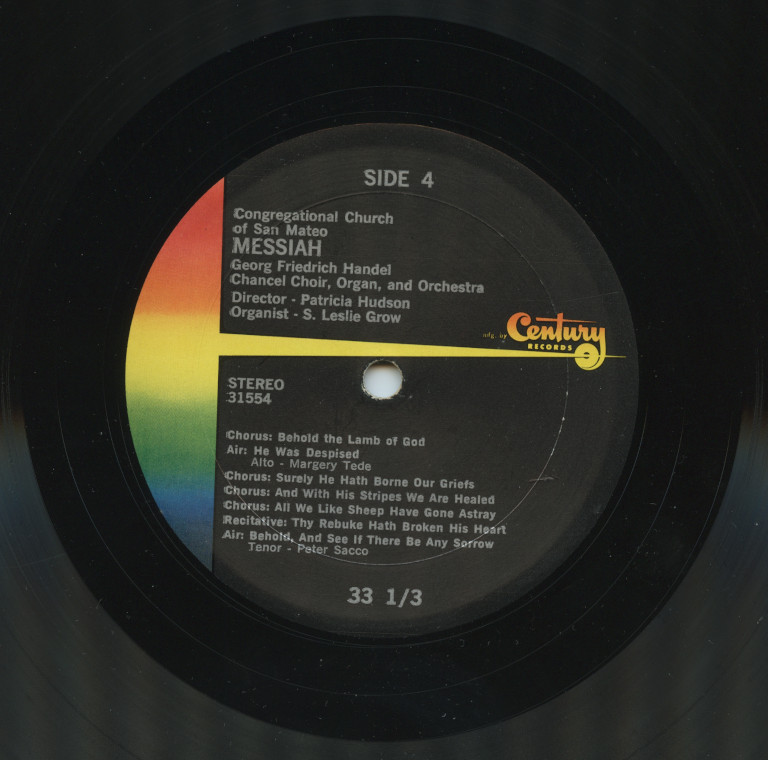
|
Chorus: Behold the Lamb of God
Air: He Was Despised Alto - Margery Tede Chorus: Surely He Hath Borne Our Griefs Chorus: And With His Stripes We Are Healed Chorus: All We Like Sheep Have Gone Astray Recitative: Thy Rebuke Hath Broken His Heart Air: Behold, And See If There Be Any Sorrow Tenor - Peter Sacco |
|
| SIDE 5 – 21:14 | ||
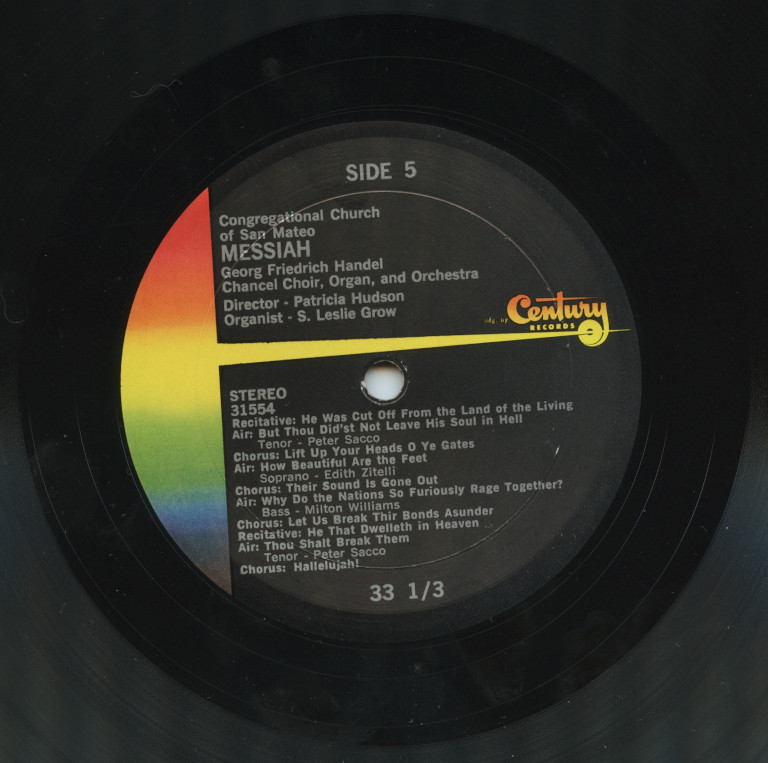
|
Recitative: He Was Cut Off From the Land of the Living
Air: But Thou Did’st Not Leave His Soul in Hell Tenor - Peter Sacco Chorus: Lift Up Your Heads O Ye Gates Air: How Beautiful Are the Feet Soprano - Edith Zitelli Chorus: Their Sound Is Gone Out Air: Why Do the Nations So Furiously Rage Together? Bass - Milton Williams Chorus: Let Us Break Their Bonds Asunder Recitative: He That Dwelleth in Heaven Air: Thou Shalt Break Them Tenor - Peter Sacco Chorus: Hallelujah! |
|
| SIDE 6 – 23:15 | ||
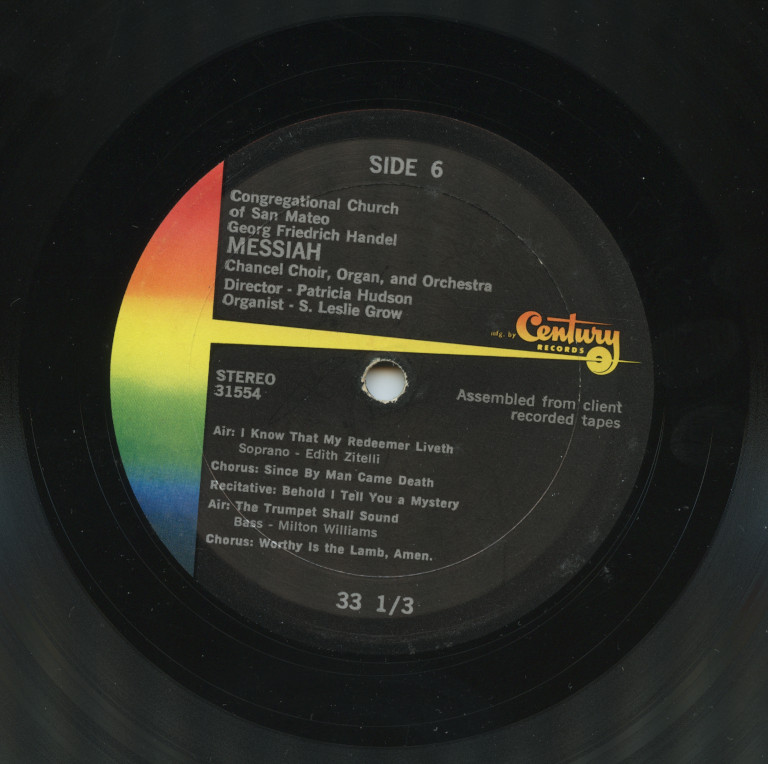
|
Air: I Know That My Redeemer Liveth
Soprano - Edith Zitelli Chorus: Since By Man Came Death Recitative: Behold I Tell You a Mystery Air: The Trumpet Shall Sound Bass - Milton Williams Chorus: Worthy Is The Lamb, Amen. |
|
from The Program:
Georg Friedrich Handel (1685-1759) composed MESSIAH in the remarkably short period of three weeks, from August 22 to September 14, 1741. It was the eleventh of 23 oratorios composed by Handel, and was to become the best-known and most frequently performed of any. The text was selected and arranged from Holy Scriptures by Charles Jennens. The first performance took place on April 13, 1742 in Dublin, Ireland.
In general keeping with Handel’s first scoring of the work, the orchestation for tonight’s presentation consists of strings, trumpets, organ, and timpani.
MESSIAH has been performed under many kinds of conditions and interpretations, with small choirs and organs to choirs of thousands and huge symphonic orchestras. Many have struggled to find the true, the real, the authentic performance – a difficult, if not impossible, task. The deeper question remains as to how this remarkable music could be so profound as to have survived over two centuries of being all things to all people while yet maintaining the capacity to continually renew itself and move the hearts of human beings.
In preparation for this performance of MESSIAH, we have been guided by the watchwords of simplicity, gentleness, poignancy, and joy. In striving for these inherent qualities, and in trying to keep them uncomplicated, we have found Handel’s MESSIAH, to be, once again, . . . new.
